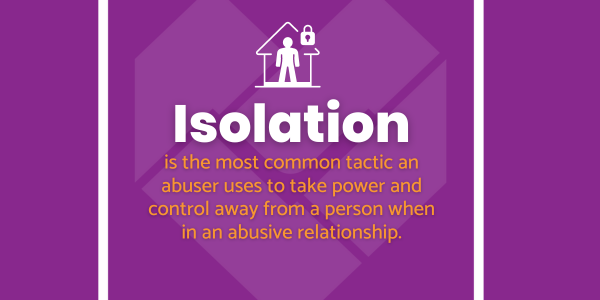By: Arezoo Shahbazi Roa, MSW, Prevention & Community Education Director of Human Options
As a domestic violence advocate focused on prevention with a mental health background, I see the long-term impact on a victim’s mental health and well-being when the abusive partner isolates them from their loved ones and support systems. Isolation isn’t something that happens overnight. It’s gradual. It’s a slow quiet process where before a person realizes it, they’ve been pulled away and disconnected from their support systems and any access to help. It is the most common tactic an abuser uses to take power and control away from a person. It not only impacts the victim, but it inherently becomes an intergenerational issue, affecting other members of the family, like children.
May is Mental Health Awareness Month, and I’d like to take some time to share how isolation occurs, what it can look like, the impact it can have on a persons’ mental wellbeing, and what to do if you notice someone you know, and love is being isolated.
Gaslighting to Isolate
The term “gaslighting” has become a buzzword in recent years and is one of the early tactics used to gain power and control from victims in abusive relationships. Gaslighting is a form of manipulation where the abusive partner creates a sense of doubt in a victims’ perception of reality, causing them to question their own feelings, instincts, and even sanity. Abusive partners use gaslighting to gradually isolate victims from their family and friends, weakening their confidence, making them easier to control.
Many victims have shared that once they were removed or disconnected from family and friends, their abuser convinced them into thinking that the trouble with their families and friends was their fault. This causes them to begin to doubt themselves and their ability to make judgments on their own, giving the abuser the power to set the narrative, and dictate reality. This often develops into the victim becoming dependent on their abuser, controlling who they can talk to and where they can go. Making someone believe what they’ve experienced isn’t really happening has a great impact on their mental health, causing victims to believe they are “not worthy”, feeling lonely, and have more heightened anxiety, which can bring on thoughts of suicide, post-traumatic stress or developing substance abuse issues.
Constant Criticism
One reason a person may begin to withdraw from their loved ones and support system is if they have experienced continued criticism from their partner. I’ve personally seen victims who endure comments about their friends, their family, their hobbies, or their job. Comments like “Your friends and family don’t love you the way I do. They don’t care about you. I don’t want you spend time with them, you act like a fool when you’re with them.” Over time, this criticism lowers their self-confidence and leaves them feeling like their abuser is right about everything. As a result, they begin to distance themselves from their support systems or the things they enjoy doing. I’ve observed how the isolation that gets created from this criticism leads to a person not having the ability to gain other perspectives from those in their support system. When this happens, they no longer have anyone in their corner to build them up and empower them to get help.
Isolation as Method of Control
Isolation is not something that can be seen. It’s typically the first way an abuser begins to take power and control away from the victim. I often hear that the abuser might insist on spending all their time together, not socializing with other people, using guilt or emotional manipulation to stay in together, and at its worst outright not letting them leave the home to be with their friends and family. When power and control has been gained through isolation, it continues and can turn into more dangerous forms of abuse. Without a support system and access to help, victims of relationship violence are more vulnerable to being manipulated. As they lose contact with their loved ones, they become dependent on the abusive partner.
The long-term impact of feeling disconnected and isolated can lead to decreased mental health and well-being. When victims share with us their anxiety is at an all-time high, like they are constantly worried, in a continued state of fear, or feeling low and depressed, like extreme sadness, or tiredness, it makes it even harder for them to access help and utilize resources. I’ve seen how using isolation creates an environment where it makes it harder to recognize the abuse and more so where and how to get out. It’s important to note that all of this can have an inherent affect on anyone else in the home.
Children can also be isolated because of what their parent is feeling and can see the impact it can have on their parent’s mental health and well-being. This can in turn affect the mental well-being of the children in the home because of the stressors they are seeing in the environment as well as what they are feeling due to their parents’ experience. If you or someone you know are experiencing these things, it’s helpful to talk about it with your child so that they don’t feel like it’s something they have done or caused, practice building healthy coping skills like deep breathing, or talk to someone who can help.
If you notice that someone you know and love or even you is being isolated by their partner, there is help. Human Options 24/7 hotline is the first lifeline for someone to begin to reclaim their power and get into safety. Our staff are trained, empathetic, and can provide options and resources to anyone in abusive or unhealthy relationships. No one should go through this alone. There are options.





